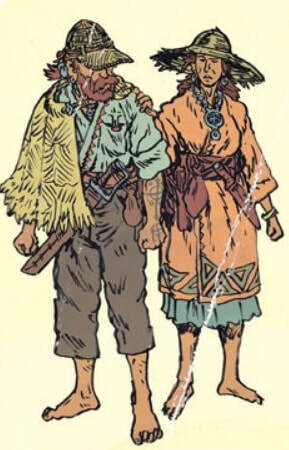The Vekhiz Language
 I was looking at the California vowel shift and thinking how, if it continued, it would create a vertical vowel system where there are just unrounded and rounded allophones of /i/, /e/, and /a/, with no back vowels at all. Thinking about how such a thing might be accomplished (no literacy, the complete breakdown of civilization, isolation from influence from other languages), I thought of the barbaric future world of the comic First Knife, which I wrote with Simon Roy and Artyom Trakhanov several years ago, and whose sequel we're now preparing. Subscribe to find out more about that ;)
I was looking at the California vowel shift and thinking how, if it continued, it would create a vertical vowel system where there are just unrounded and rounded allophones of /i/, /e/, and /a/, with no back vowels at all. Thinking about how such a thing might be accomplished (no literacy, the complete breakdown of civilization, isolation from influence from other languages), I thought of the barbaric future world of the comic First Knife, which I wrote with Simon Roy and Artyom Trakhanov several years ago, and whose sequel we're now preparing. Subscribe to find out more about that ;)But anyway, maybe in some secluded Rocky Mountain valley, the descendants of 21st-century Californians might survive as mystical mountain-men. How exactly would you say "The Rocky Mountains" in their mystical mountain language?
Although the Vekhi call their homeland Dekhmwuz /ˈdekhˈmwɶz/, they would probably translate "The Rocky Mountains" as Dwuzawekhsall /ˈdwɶzaˈwekhsal/.
d-wu-z-a-wekh-s-alldef-MOUNTAIN-plural.head-plural.tail-ROCK-plural.tail-adj"the mountains are rocky-like""Vekhi" itself is an semi-exonym applied to them by the Hudsoni and Yanqui civilizations to the east. The hillsmen’s own name for themselves is Vekhsa /ˈvekhsa/, clipped from such sentences as Vekhses /ˈvekhˈses/.
vekh-s-esROCK-head-(plural.tail)-1ST.plur.tail (this particular tail-pronoun has a 0-prefix)"Rock is us."A Vekhiz sentence is composed of a “head” and “tail,” citation form H-z and z-T, combined form H-z-T. For example:
Mountain: Mwuraz- -zwu, Mwurazwu ("A mountain is a mountain")Rock: Vekhs- -zhwekh, Vekhshwekh ("A rock is a rock")Fish: Fes- -fesh, fefesh (“A fish is a fish”)Eating: Iyaz- -ziya (“Eating is eating”)So much for copular constructions. Here’s how action verbs work:
“Daniel eats a fish.”Deyangalziyafesh /ˈdejaŋaɫˈzijafˈeʃ/Deyangal-z-iy-a-feshDANIEL-head-EAT-tail-FISHOn the other hand:
Deyangalzyiwafesh /ˈdejaŋaɫˈzjiwaˈfeʃ/Daniel is eaten by a fishDeyangal-z-yi-w-a-feshDANIEL-head-EAT-passive-tail-FISHHow did such an alien language evolve from English? In fact, the only differences are pronunciation and the way speakers break utterances up into words.
Take Dwuzawekhsall (“The mountains are rocky”). Vekhiz speakers would break that into dwuza (the definite form of Mwuza, “mountains”) and zawekhsall (the plural tail form of vekhiz “rocky,” with the adjectival suffix -all).
However, you or I would break it down as:
D wuz a wekhs-allThe mountains are rockies-like.That's a 1-to-1 translation. It only departs from general American at the end, because sound shifts leveled "are rocky" "are rockies" and "are rocks" into one form, and Vekhiz-speakers had to clamp "-like" to the end in order to disambiguate the adjective and the noun.
So that’s Vekhiz. It's more of a game than a conlang, and I've been having fun with it. I like the Bronze-age majesty of "Deyangalz" and whenever I say "Dwuzawekhsall" out loud, I get the tune to "nkosi sikelel iAfrica" stuck in my head.
Ask me, and I’ll give you your name in Vekhiz ;)
Published on May 13, 2025 07:15
No comments have been added yet.



